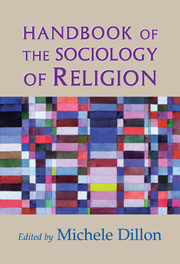Book contents
- Frontmatter
- Contents
- List of Contributors
- Acknowledgment
- Part One Religion as a Field of Sociological Knowledge
- 1 The Sociology of Religion in Late Modernity
- 2 Studying Religion, Making it Sociological
- 3 The Ritual Roots of Society and Culture
- 4 Social Forms of Religion and Religions in Contemporary Global Society
- 5 The Evolution of the Sociology of Religion
- Part Two Religion and Social Change
- Part Three Religion and the Life Course
- Part Four Religion and Social Identity
- Part Five Religion, Political Behavior, and Public Culture
- Part Six Religion and Socioeconomic Inequality
- References
- Index
2 - Studying Religion, Making it Sociological
Published online by Cambridge University Press: 05 June 2012
- Frontmatter
- Contents
- List of Contributors
- Acknowledgment
- Part One Religion as a Field of Sociological Knowledge
- 1 The Sociology of Religion in Late Modernity
- 2 Studying Religion, Making it Sociological
- 3 The Ritual Roots of Society and Culture
- 4 Social Forms of Religion and Religions in Contemporary Global Society
- 5 The Evolution of the Sociology of Religion
- Part Two Religion and Social Change
- Part Three Religion and the Life Course
- Part Four Religion and Social Identity
- Part Five Religion, Political Behavior, and Public Culture
- Part Six Religion and Socioeconomic Inequality
- References
- Index
Summary
Not long ago, a student stopped by with a problem. “I have this great topic on religion,” she began, “but I don't know how to make it sociological.” We chatted briefly about her topic (why siblings often have such different views about religion), and after I suggested some readings, she went away. But her question stayed with me. She was interested in studying religion, but puzzled about how to do it sociologically.
This student's quandary speaks volumes about religion as a field of sociological inquiry and the intellectual challenges facing it at the start of the twenty-first century. Her question stayed with me because it had been asked so often before. In my experience, the question often surfaces most forcefully when students contemplate topics for their senior thesis. They typically select a topic after weeks of anguishing to find something that will engage their attention longer than any project they have ever worked on before. They want it to be meaningful, perhaps helping them to sort out their own beliefs and values, or addressing some issue in the wider society. For one or both of these reasons, they settle on something having to do with religion (interfaith marriage, gender and religion, the religious experiences of a particular ethnic or immigrant community, how religion motivates altruism, why some people believe in God and others don't, whether religion influences how people vote, why people join cults, or religion and the family, to name a few). They are not untutored in sociology, either.
- Type
- Chapter
- Information
- Handbook of the Sociology of Religion , pp. 16 - 30Publisher: Cambridge University PressPrint publication year: 2003
- 10
- Cited by



